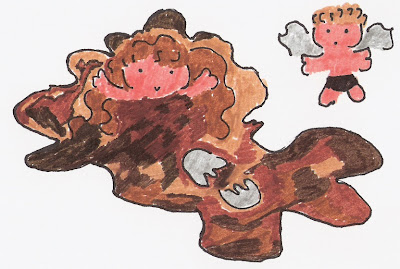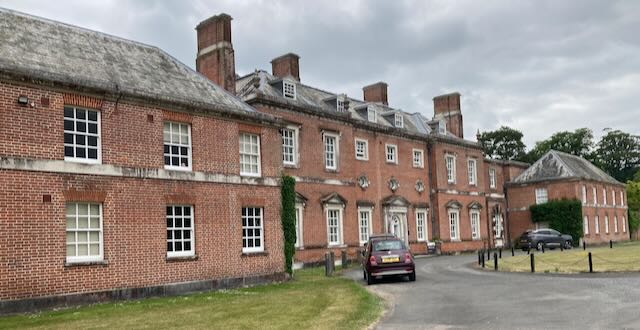 Happy New Year!
Happy New Year!
¡Felíz Año Nuevo!

Nauta
Happy New Year! Today, we´re going to begin a new section in this blog.
¡Feliz año nuevo! Hoy vamos a abrir una nueva sección en este blog.
When I was at school, I learned Greek like you learn English. And I learned it reading stories. I´m going to tell you some of these stories.
Cuando yo iba a la escuela, aprendí Griego como tu aprendes inglés. Y lo aprendí leyendo cuentos. Voy a contaros algunos de estos cuentos.
They are part of Latin and Greek mythology. And we´ll start at the very beginning, because it´s a very good place to start.
Son pare de la mitlogía latina y griega. Y empezaremos at principio, porque es el mejor lugar para empezar.
But first, to open my section, I must invoke Janus. He is the god of entrances and beginnings.
Pero primero, para abrir mi sección debo invocar a Jano. Es el dios de las entradas y salidas.

Janus
I! I am Janus. I have two faces. I am the god of entrances and beginnings.
¡Yo! Yo soy Jano. Tengo dos caras. Soy el dios de las entradas y salidas.
Did you ever ask yourself why the first month of the year is called January?
¿Alguna vez te has preguntado porque el primer mes del año se llama January en inglés?
It´s because of me, Janus. I open the new year so that the days can come out. I will open this section for Nauta.
Es por mi, Jano. Yo abro el año nuevo para que los días puedan ir saliendo. Abriré el año para Nauta.
Good luck with your section, Flaccus Intrepidus Nauta.
Buena suerte con tu sección, Flaco Intrepido Nauta.

Nauta
Thank you, Janus. Like I said, we´ll start at the very beginning, with the story of the creation of the world according to classic mythology.
Gracias, Jano. Como dije, empezaremos por el principio, con la historia de la creación del mundo según la mitología clásica.
In classic mythology, there are different versions of the story of the beginning of things.
En la mitología clásica, hay distintas versiones de la historia del comienzo de las cosas.
One story says that at first, everything existed all mixed up. That was Khaos, the caos.
Un relato dice que al principio todo existía, pero mezclado. Eso era el caos, Khaos.

The first two things to come out of Khaos were a dove and a serpent.
Las dos primeras cosas que salieron del Khaos fueron una paloma y una serpiente.

Eurynome and Ophion
We! We are the dove Eurynome and the serpent Ophion. We came out of Khaos and everything else came out after us.
¡Nosotros! Nosotros somos la paloma Eurinome y la serpiente Ofión. Salimos del Khaos y todo lo demás salió despues de nosotros.
Nauta
A second version of the story of creation says that the first to exist were the Protogonoi.
Una segunda versión de la historia dice que los primeros en existir fueron los Protogenoi. Singular protogenos.The Protogonoi made up the fabric of the Universe. There are many Protogonoi. They came out of Nothingness.
Ellos constituían la materia del universo. Hay muchos Protogenoi. Salieron de la Nada.
First came Thesis, the Protogonos of Creation. She had the form of a muddy mixture of elements.
Primero llego Thesis, la diosa de la creación. Tenía la forma de una mezcla lodosa de elementos.
From her came Phanes, the Protogonos of Generation. He was born from a silver egg.
De ella salió Fanes, la generación. Nació de un huevo de plata.
Thesis and Phanes
We are the first Protogonoi.
Somos los primeros protogenoi.
We are Thesis, who came out of the muddy mixture of elements and Phanes, born from a silver egg.
Somos Thesis, que salió de una mezcla lodosa de elementos y Fanes, nacido de un huevo de plata.
Nauta
There are many more Protogonoi in the picture below. See if you can identify them. You can enlarge the picture to see them better.
Hay muchos más protogenoi en el dibujo de abajo. A ver si los puedes identificar. Puedes agrandar el dibujo para verlos mejor.
One of them is Gaia, the Mother Earth.
Uno de ellos es Gaia, la madre tierra.Bits broke off from the Mother Earth and became the islands, called Nesoi.
Se soltaron trocitos de la madre tierra que se convirtieron en las islas, llamadas Nesoi.
The Ourea are the mountains and their rocky forms rose out of the Mother Earth.
Las montañas se llaman Ourea, y sus formas rocosas surgieron de la madre tierra.Okeanos was the fresh water that encircled the earth.
Okeanos era el agua dulce que rodea la tierra.Tethys was the fresh water that flowed within caverns beneath the earth.
Tethys era el agua dulce que fluye por las cavernas subterraneas.
Pontos was the sea and Thalassa was the surface of the sea.
Pontos era el mar y Thalassa era la superficie del mar.
Khaos, the air, filled the gap between heaven and earth.
Khaos era el aire, y llenaba el espacio entre el cielo y la tierra.
Hemera was the Protogonos of the Day, clothed in a sky-blue mantle.
Hemera era el día, vestida con un manto azul celeste.Nyx was the Night. She wore a star-spangled black mantle.
Nix era la noche. Llevaba un manto negro decorado con estrellas.

Aither was the Protogonos of the Mists of Light, shining in the highest part of the firmament.
Aether era las nieblas de luz que brillan en la parte más alta del firmamento.Erebos was the Protogonos of the Mists of Darkness, that floated all over the underworld.
Erebos era las nieblas de la oscuridad que flotan por el inframundo.Ouranos was the solid dome of Heaven.
Ouranos era el techo del cielo.
Tartaros was the pit of hell beneath the Earth.
Tartaros era el agujero que había debajo de la tierra.Ananke was the Protogonos of Inevitability, Compulsion and Necessity. She was the wife of Khronos, the Protogonos of Time. They encircled the universe in the shape of serpents.
Ananké era la inevitabilidad, la compulsión y la necesidad. Era la esposa de Kronos, el tiempo. Rodeaban el universo con forma de serpiente.

Phusis
And I am Phusis, Mother Nature herself.
Y yo soy Fusis, la madre naturaleza.Nauta, that´s enough for today!
¡Nauta! ¡Ya basta por hoy!MINI QUIZ
1. Janus is the god of entrances and beginnings. How many faces does he have? /Jano es el dios de las entradas y salidas. ¿Cuantas caras tiene?
2. Nauta tells two versions of the Greek myth of the beginning of the universe. Khaos is mentioned in both, In the first version, Khaos is a mixture of everything there is in the universe, all mixed up. Who is Khaos in the second version? / Nauta cuenta dos versiones del principio del universo. Khaos aparece en ambas. En la primera versión Khaos es una nezcla desorganizada de todo lo que hay en el universo. ¿Quién es Khaos en la segunda versión?
3. Ocean is another word for sea. Is Okeanos the sea? / Océano es otra palabra para mar. ¿Es Oceano el mar?
4. What is the plural of Protogonos? / ¿Cual es el plural de Protogeno?
5. What does Nyx have on her mantle? / ¿Qué tiene Nix en su manto?











































.jpg)














